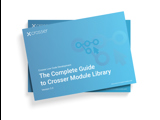Optimize your Flows with Data Driven Processing
When building Flows for industrial integration use cases, we often come across protocols like Modbus, OPC UA and S7. For those protocols, we provide modules that allow you to use ‘resource files’ to define which data you want to select/subscribe to. The output of those modules is typically a value, or set of values with some additional protocol specific properties. Once the information is available, you design your flow so that it covers your use case. Usually, you will get various different tag-types like temperature, velocity, pressure, … from that one source which leads to the question, how can you introduce tag-specific logic to your flow?
For this purpose, you can add metadata to each tag in your resource file which will become part of the flow message.
The additional metadata can then be used in other modules to introduce tag-specific processing, like converting values, filtering for values within a range or to specify on what MQTT topic the tag should be published.

With this approach you can maintain a quite simple and generic flow which treats each data tag individually based on your requirements.
In combination with parameters, this concept will help you scale your use cases to different environments.
Read more about Data Driven Processing here→

